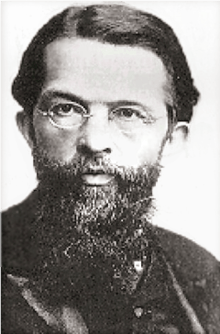
Carl Menger.
Carl Menger (February 23, 1840 – February 26, 1921) was an Austrian economist, known as founder of the Austrian School of economics. Menger contributed to the development of the theory of marginal utility, which contested the cost-of-production theories of value, developed by the classical economists such as Adam Smith and David Ricardo.
Quotes
- There is no better means of reducing a fallacious variety of thought to absurdity than to let it live itself out completely.
- Attributed to Carl Menger in: Ludwig Von Mises, "Comments about the mathematical treatment of economic problems." Journal of Libertarian Studies, Spring 1977, 1(2), p. 100
Principles,
Carl Menger, Principles,
- The time period lying between command of goods of a higher order and possession of the corresponding goods of lower order can never be eliminated.
- p. 67; cited in: Randall G. Holcombe, Great Austrian Economists, p. 90
- Assuming... that all available goods of higher order are employed in the most economic fashion, the value of a concrete quantity of a good of higher order is equal to the difference in importance between the satisfactions that can be attained when we have command of the given quantity of the good of higher order whose value we wish to determine and the satisfactions that would be attained if we did not have this quantity at our command.
- p. 164-5; cited in: Randall G. Holcombe, Great Austrian Economists, p. 90
Investigations into the Method of the Social Sciences, 1883
Carl Menger (1883). Investigations into the Methods of the Social Sciences with Special Reference to Economics. New York: New York University Press, 1985; Ludwig von Mises Institute, 1985/1996
- Not only in the realm of the ethical world, and of economy, but also in that of natural phenomena, the realistic orientation of theoretical research can lead only to "real types" and "empirical laws." And in the above point of view, at any rate, no essential difference between the ethical and the natural sciences exists, but at most only one of degree. The realistic orientation of theoretical research excludes in principle, rather, in all realms of the world of phenomena the possibility of arriving at strict (exact) theoretical knowledge.
- p. 58
- How can it be that institutions which serve the common welfare and are extremely significant for its development come into being without a common will directed toward establishing them?
- p. 146
- The solution of the most important problems of the theoretical social sciences in general and of theoretical economics in particular is thus, closely connected with the question of theoretically understanding the origin and change of 'organically' created social structures.
- p. 147
Quotes about Carl Menger
- Almost everything that makes the Austrian school of economics distinctive was found in Menger—marginal utility, subjective value, emphasis on knowledge and foreknowledge, the importance of prices, spontaneous generation of societal institutions, and economic activity as a process occurring over time. From a more practical perspective, during the 1890s and early 1900s, he was the informal leader of a group of civil servants and academics who regularly met for coffee at Vienna’s famous coffeehouses to discuss the issues of the day.
- Alan Ebenstein, Hayek's Journey: The Mind of Friedrich Hayek (2003), Ch. 3. The Austrian School of Economics
- The development of economics as a science which is always based on human beings, the creative actors and protagonists in all social processes and events (the subjectivist conception), is undoubtedly the most significant and characteristic contribution made by the Austrian School of economics, founded by Carl Menger. In fact Menger felt it vital to abandon the sterile objectivism of the classical (Anglo-Saxon) school whose members were obsessed with the supposed existence of external objective entities (social classes, aggregates, material factors of production, etc.). Menger held that economists should instead always adopt the subjectivist view of human beings who act, and that this perspective should invariably exert a decisive influence on the way all economic theories are formulated, in terms of their scientific content and their practical conclusions and results.
- Jesús Huerta de Soto (2006/12), Money, Bank Credit, and Economic Cycles, p. 267, Note 3,
External links
- "Carl Menger." The Concise Encyclopedia of Economics. 2008. Library of Economics and Liberty.
This article is issued from
Wikiquote.
The text is licensed under Creative
Commons - Attribution - Sharealike.
Additional terms may apply for the media files.